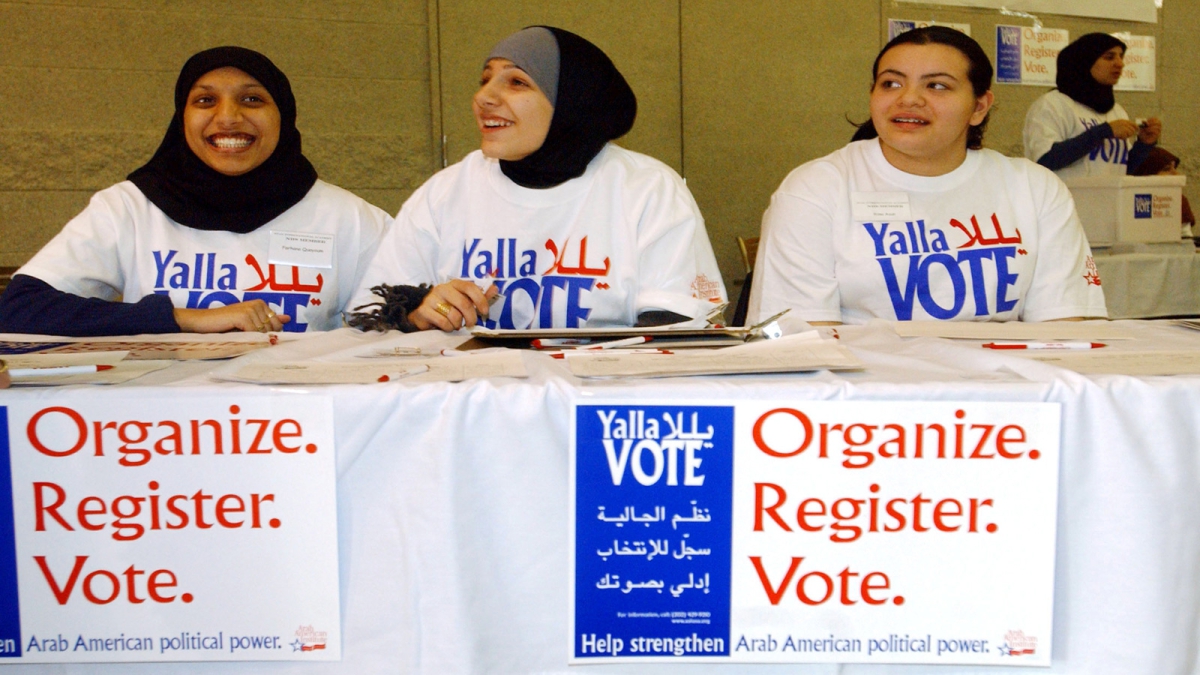Arab American Voters: Clinton 60%, Trump 26%

For years, Arab American voters, like most other ethnic communities, slightly leaned toward the Democratic party but were swing voters in national and local elections. This was the pattern we observed in the early years of our more than two decades of biannual surveys of the community's voting behavior. It is no longer the case, as Arab Americans have increasingly come to identify themselves as Democrats and vote for Democratic candidates.
In a book I wrote back in 2001 on the values and voting patterns of a number of ethnic American communities ("What Ethnic Americans Really Think”—based on polling conducted by my brother's group, Zogby International) we found that most ethnics leaned Democrat but shared a value system that ran counter to the political ideas offered by what were then called "moderate Republicans" and "New Democrats". The tendency of both was to combine fiscal conservatism with social liberalism. Many ethnic voters, on the other hand, embraced beliefs that were the exact opposite. They were fiscally progressive and socially more conservative. They believed that government played a constructive role is society and they were, therefore, supportive of strengthening programs like Social Security and Medicare, investing in public education, and expanding health care coverage. At the same time, they were small business people with extended family networks who believed in building strong communities and, therefore, had belief systems that reflected those values.
Beginning in 2002 and continuing during the next decade, the community drifted away from the Republican Party. There were a number of factors that fueled this drift. Initially, it was the post-9/11 reaction of the Bush Administration that compromised the civil liberties of recent immigrants, followed by the War in Iraq, and then the hard line rhetoric that came to dominate the GOP. The first to be affected were those Arab Americans who were more recent immigrants and Muslim. While Arab Americans who had been born in the US had stronger party identification, those who were immigrants were classic "swing voters". But, as our polling demonstrated, all parts of the community were repulsed by and felt threatened by the increased harsh anti-Arab and anti-Muslim rhetoric. In our most recent poll of Arab Americans, 50% of all those surveyed said they had personally experienced discrimination because of their ethnicity, while 53% expressed concern that they might face discrimination in the future.
In reality, it might be said that it wasn't the community that drifted away from the Republicans, it was the party that was galloping away from Arab Americans. This parting of the ways especially intensified during the elections from 2008 to 2016, culminating in the nomination of Donald Trump. The impact of all this can be seen in the results of this year's Arab American Institute (AAI) poll.
In an October poll of likely Arab American voters, Hillary Clinton smothers Donald Trump, by a margin of 60% to 26%. Commissioned by the AAI and conducted by Zogby Analytics, the survey found that the movement of Arab Americans away from the Republican Party has continued. Arab Americans now favor the Democratic Party over the Republicans by two to one—with 52% identifying as Democrats and only 26% who say they are Republicans. And when asked which party they prefer to control Congress, by a margin of 54% to 27% Arab Americans say they favor the Democrats.
When asked why they would vote for either Clinton or Trump, Arab Americans gave surprisingly similar responses. Over 40% of Clinton voters said they were supporting her either because of party loyalty or because they liked her domestic policies. Another third said they were, in fact, voting against Trump. Only one in ten identified foreign policy as the reason they were supporting Clinton.
Supporters of both Clinton and Trump identified "Jobs and the economy" as the most important issue in determining their vote. But that was where the similarity ended. While Democrats pointed to gun violence, health care, and Social Security and Medicare as next in importance, Republicans identified combating terrorism, the budget deficit and controlling government spending, and immigration as their most important concerns. And when asked on which issues they felt Clinton would be best able to address, Arab Americans added improving education and race relations to the mix.
What emerges from this survey is that while Arab American Democrats and Republicans share the basic beliefs of their respective parties, the former is growing while the latter is shrinking. The bottom line here is that while not "in love" with Clinton”—as they were with Obama in 2008—
most Arab Americans have come to feel more comfortable voting for Democrats because they feel more aligned with the issues and values of that party.
Especially interesting is the fact that the gap that once existed between the immigrant and native born and the Catholic and Muslim components of the Arab American community has, over time, disappeared. Party identification and candidate preferences are now largely the same for all groups. This has meant that immigrants are now more comfortable identifying as Democrats and are less likely to be swing voters. At the same time, the once more evenly matched party id of the native born group has changed rather significantly.
Topics: American Muslims, Arab Americans, Elections
Views: 1476
Related Suggestions

















